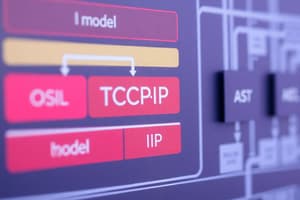Podcast
Questions and Answers
What is the primary function of a firewall in a network?
What is the primary function of a firewall in a network?
- To control data coming in and out of the network (correct)
- To manage traffic based on IP addresses
- To monitor network performance
- To connect different LANs together
Which of the following brands is known for producing firewalls?
Which of the following brands is known for producing firewalls?
- Netgear
- D-Link
- TP-Link
- Cisco ASA (correct)
Layer 2 switches primarily direct traffic based on which type of addresses?
Layer 2 switches primarily direct traffic based on which type of addresses?
- Logical addresses
- Domain names
- Network addresses
- Physical addresses (correct)
The concept of scalability in network design refers to what?
The concept of scalability in network design refers to what?
What type of backup only copies data that has changed since the last backup?
What type of backup only copies data that has changed since the last backup?
Which tool is commonly used to check if a device in a network is reachable?
Which tool is commonly used to check if a device in a network is reachable?
What is the purpose of redundancy in network design?
What is the purpose of redundancy in network design?
Which type of backup captures all data changes since the last full backup?
Which type of backup captures all data changes since the last full backup?
What does the OSI Model represent in networking?
What does the OSI Model represent in networking?
Which of the following is true about IP addressing?
Which of the following is true about IP addressing?
What is the primary function of Group Policy Objects (GPOs)?
What is the primary function of Group Policy Objects (GPOs)?
What role does the Windows Server perform regarding DNS?
What role does the Windows Server perform regarding DNS?
How does Microsoft Exchange facilitate communication?
How does Microsoft Exchange facilitate communication?
Which component of Active Directory is like a big family tree?
Which component of Active Directory is like a big family tree?
What does mailbox management primarily involve?
What does mailbox management primarily involve?
What is the purpose of email flow in Microsoft Exchange?
What is the purpose of email flow in Microsoft Exchange?
Study Notes
Networking Basics
- OSI Model divides data transmission into seven layers, each with specific tasks like data packaging and error checking.
- TCP/IP Model simplifies networking into four layers, focusing on internet communication protocols such as HTTP for web browsing and SMTP for email.
- Every device has a unique IP address, with IPv4 being the older system and IPv6 accommodating a greater number of devices.
Active Directory (AD)
- AD is structured like a family tree, where domains represent individual members, trees represent related groups, and forests are large collections of these trees.
- User and Group Management involves setting up user accounts and permissions, ensuring proper access within an organization.
- Group Policy Objects (GPOs) set rules that govern user and computer actions, promoting uniformity in company operations.
Microsoft Exchange
- Exchange is a comprehensive email system for businesses, providing email, calendar, and contact management.
- Mailbox Management focuses on creating and maintaining user mailboxes for effective communication.
- Email Flow describes the process of message delivery, akin to a postal system ensuring emails reach their intended recipients.
Microsoft Infrastructure Management
- Windows Server Roles include various functions a server can perform, such as DNS for name resolution and DHCP for dynamic IP address allocation.
- Basic Management involves maintaining server roles to ensure operational efficiency and reliability.
Firewalls and Switches
- Firewalls serve as network security guards, enforcing rules that govern data entry and exit to protect network integrity.
- Common firewall brands include Cisco ASA, Palo Alto, and Fortinet, known for their security solutions.
- Troubleshooting firewalls requires analytical skills to identify and resolve connectivity issues.
Layer 2 and Layer 3 Switch Administration
- Layer 2 Switching directs data flow based on MAC addresses, allowing traffic segmentation through VLANs for different data types.
- Layer 3 Switching enhances data routing based on IP addresses, optimizing the path taken for data across networks.
Network Conception and Troubleshooting
- Network Topology refers to the arrangement of network components; common types include star, mesh, and ring layouts.
- Scalability ensures network expansion capabilities, while Redundancy provides alternative paths to maintain operations during failures.
- Security measures protect network systems from intrusions, akin to fortified locks and alarms.
Troubleshooting Techniques
- A systematic approach to troubleshooting follows a logical methodology to pinpoint issues, similar to detective work.
- Common diagnostic tools include ping for connectivity checks, traceroute for path analysis, and Wireshark for in-depth data packet inspection.
Backup Systems
- Various Backup Types include Full backups (all data), Incremental backups (changes since last backup), and Differential backups (changes since last full backup).
- A well-thought-out Backup Strategy is essential for data protection, determining frequency and scope of backups.
- Common Backup Software assists in managing data backups, ensuring recovery options are reliable.
Studying That Suits You
Use AI to generate personalized quizzes and flashcards to suit your learning preferences.
Description
Test your understanding of fundamental networking concepts such as the OSI and TCP/IP models. Explore the intricacies of how data is transmitted over networks, including the importance of IP addressing. This quiz is essential for anyone looking to strengthen their IT skills.




